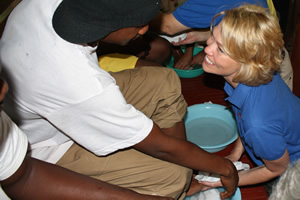Food For The Poor Organizes Prisoner Releases, Nonviolent Offenders Freed in Jamaica, Guyana and Haiti
Untitled Document
 | |
Natalie Carlisle, a Food For The Poor staff member, washed the feet of the nonviolent inmates at St. Catherine Adult Correctional Centre before they were released. | |
Related Information: | |
COCONUT CREEK, Fla. (Dec. 17, 2012) – Hearing visitors’ voices in the corridor, anxious prisoners race to stretch their arms through the cell door bars; praying someone from the outside will squeeze their hand.
Fifteen prisoners from St. Catherine Adult Correctional Centre in Spanish Town, Jamaica, were escorted from their cells to a room, where they were greeted by Food For The Poor staff and donors from the United States. Just as Jesus washed the disciples’ feet – the visitors kneeled before the prisoners, and gently washed the inmates’ feet. Dressed in new shoes, the cleansed inmates learned Food For The Poor donors had paid the fines for their nonviolent offenses, and that they would be released in time to spend Christmas with their families.
“We all make mistakes and can testify that we have received many chances from persons who love and care for us,” said Jacqueline Johnson, Food For The Poor-Jamaica’s Executive Director, to the inmates at St. Catherine Adult Correctional Centre.
Johnson encouraged each beneficiary to return to society not being bitter men, but being grateful. “If ever you should return, come back not as an inmate, but rather as an inspiration and a beacon of light to the men you’ll be leaving here today,” she said.
“When I heard my name, I thought there was another inmate with that name in the room,” said a 23-year-old inmate released from Tamarind Farm Adult Correctional Centre in Jamaica. “I couldn’t believe it, but I thank Food For The Poor and the donors for a second chance.”
This year in Jamaica, a total of 18 inmates were released from prisons in Spanish Town and Kingston.
Twice a year – during the Christmas and Easter seasons – it is a Food For The Poor tradition to release nonviolent inmates who have been incarcerated due to their inability to pay the required fines for committing minor offenses. This year prisoners also will be released in Guyana and Haiti.
In developing countries, the destitute sometimes have no way to feed their families other than to steal food. The consequence often is imprisonment without first appearing before a judge, or receiving a prison sentence. Sometimes, by the time they are tried, they have spent years longer in jail than their prison sentence requires.
“When you visit a prison, desperate eyes peer out of the dark cells, into the light, pleading silently for help,” said Robin Mahfood, Food For The Poor’s CEO/President. “They want to feel a connection with the outside world, to be a brother in Christ, to be prayed for – and not to be forgotten.”
Food For The Poor’s Prison Ministry Program is based on the scripture, “When was it that we saw you sick or in prison and visited you…” (Matthew 25: 31-46).
Food For The Poor, named by The Chronicle of Philanthropy as the largest international relief and development organization in the nation, does much more than feed millions of the hungry poor in 17 countries of the Caribbean and Latin America. This interdenominational Christian ministry provides emergency relief assistance, clean water, medicines, educational materials, homes, support for orphans and the aged, skills training and micro-enterprise development assistance, with more than 96 percent of all donations going directly to programs that help the poor.
For more information, please visit www.FoodForThePoor.org.
Jennifer Leigh Oates
Public Relations
(954) 427-2222 x6054
jennifero@foodforthepoor.org
